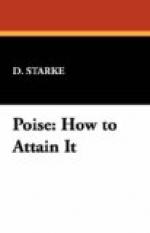It is, then, advisable to devote several minutes every day to breathing exercises, not merely automatic, but purposeful and under thorough control.
To accomplish this there are two methods.
The first, very easy of comprehension, is to lie down on one’s back and to breathe deeply with the mouth closed and the nostrils dilated.
As much air as can be held must be taken into the lungs, then the mouth must be opened and the air must be allowed to escape gradually.
During this operation one should pay particular attention to expanding the walls of the chest, while flattening the stomach.
About twenty deep respirations are required to accomplish the desired effect.
Little by little the lungs will dilate and one will unconsciously increase the length of the inspiration and the slowness with which the air is expelled.
The second method consists in standing erect, with the head thrown slightly back. The lungs should then be filled with air and one should count mentally up to five or even ten before exhaling the air that has been breathed in.
It is advisable that when exhaling one should utter a continuous hum, which must be absolutely free from trembling when one has practised it properly.
People who have practised this exercise have often stated that this method of breathing has been of great help to them when much fatigued as well as a first-class stimulus in moments when all their physical powers were to be called into play.
A well-known college professor has assured us that every day, before giving his lectures, he makes use of this exercise. He claims that he has thus gained a freedom of breathing the good effects of which are manifest in the facility with which he is able to give his lecture and in his general feeling of ease. Rendered quite free from any suspicion of nervousness, he feels that he is completely master of himself and in a fit state of moral and physical health to employ the poise that is essential to the man who has to instruct and to convince others.
Deep breathing has the further advantage of developing the lungs, of strengthening them, and at the same time of making their ordinary functioning more regular.
The man who practises this exercise will have much less propensity to get out of breath. This will be a great assistance to those timid people who are disconcerted by trifles and who, at the least little occurrence, become so much affected by emotion that they experience a sensible acceleration of the action of the heart.
Palpitation can not take place without causing us physical discomfort, and this condition is a serious stumbling-block in the way of the acquisition of poise, for, in view of the great stress the man of timidity lays upon the opinion of others, he will be apprehensive of giving them any inkling of his distress, and yet his difficulty in breathing will be bound to reveal it.




